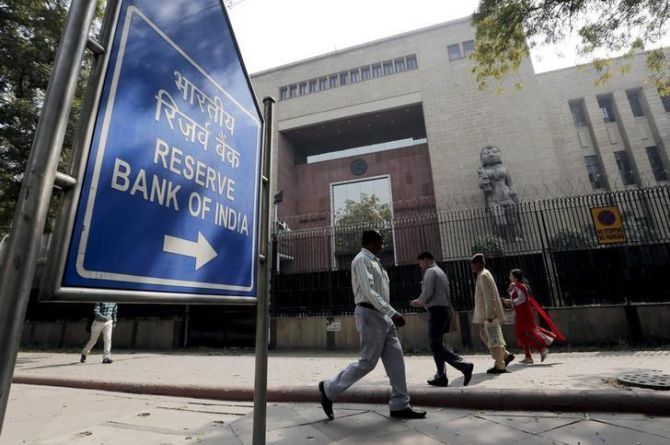 | « Back to article | Print this article |
If implemented, CEOs really will have to be responsible for their bank’s performance unlike the present practice of handpicked board members green lighting their heavy salaries.

The Reserve Bank of India (RBI) has proposed inserting a clause in compensation packages of private bank chief executive officers (CEO) that would allow for a penalty if the bank concerned underreports bad debt or provision beyond the central bank’s tolerance.
“Wherever the assessed divergence in the bank’s asset classification or provisioning from the RBI norms exceeds the prescribed threshold for public disclosure, the bank shall not pay the unvested portion of the variable compensation for the assessment year.
"Further, in such situations, no proposal for increase in variable pay (for the assessment year) shall be entertained,” the RBI said in a discussion paper released on Monday late night.
The central bank also said there should be no concept of “guaranteed bonuses” in the compensation plan.
These provisions are part of a host of new rules that the central bank brought forward in the discussion paper that aims at making CEOs more accountable for their bank’s performance and drastically limits the person’s non-cash compensation benefits such as stock options.
If implemented this would erode the celebrity status of CEOs of private banks.
The last date for commenting on the draft rules is March 31.
The RBI also wanted to introduce a set of “quantitative and qualitative criteria” “for identification of material risk takers,” such as whole-time directors and CEOs.
In the paper, the RBI proposed that at least half of the compensation of a CEO should be variable.
There was no such threshold earlier.
The stock options should be part of the variable pay, against the extant practice of keeping it beyond and above the scope of the official compensation package.
“The compensation should be in adherence with all statutory requirements.
"Further, in accordance with FSB (Financial Stability Board) Implementation Standards, a substantial proportion of compensation i.e. at least 50 per cent, should be variable, and paid on the basis of individual, business-unit and firm-wide measures that adequately measure performance …” the discussion paper said.
However, variable pay, with stock options included, can be capped at 200 per cent of the fixed pay.
Earlier, the variable pay was capped at 70 per cent of fixed pay but did not include stock options.
The central bank further prescribed that at least half of the variable pay should be via non-cash component.
The RBI proposed a compulsory deferral mechanism for variable pay, which means that the bonuses may not be given in the same period, regardless of the quantum of the pay.
Earlier, such a payment was mandated only beyond a specified threshold.
Importantly, the central bank proposed “mandating imposition of malus (penalty) in case of divergence in NPA/provisioning beyond RBI prescribed threshold for public disclosure.”
The discussion paper comes on the heels of a few private sector bank CEOs getting roughed up by the regulator, and eventually fired from their positions, essentially for underreporting bad debt.
As per RBI’s rules, if the divergence, between what the bank reported and RBI’s auditors found, differs by more than 15 per cent, the banks have to disclose such divergence.
It is worth mentioning here is that the central bank did not approve the full bonuses of some private sector bank CEOs for 2016-17 and 2017-18 as those banks showed heavy divergence in their assessment of bad debt, and what RBI auditors unearthed the bad debts as.
The discussion paper said that the compensation of the material risk takers should be adjusted for all types of risk, and the outcomes are symmetric with risk outcomes, and the compensation payouts are sensitive to the time horizon of the risk.
The mix of cash, equity and other forms of compensation should be consistent with risk alignment, the RBI said.
Private sector banks and foreign banks operating through a subsidiary route (only two such banks so far) are required to take RBI approval for grant of remuneration to whole time directors and CEOs.
The approval process takes into account the set guidelines, which the central bank proposed to overhaul through the newly introduced rules.
If accepted, CEOs really will have to be responsible for their bank’s performance unlike the present practice of handpicked board members green lighting heavy salaries of such bank CEOs.
Photograph: Anindito Mukherjee/Reuters